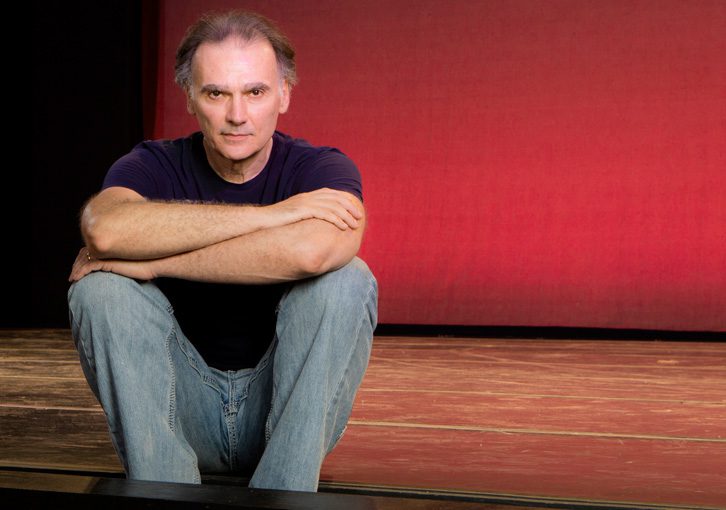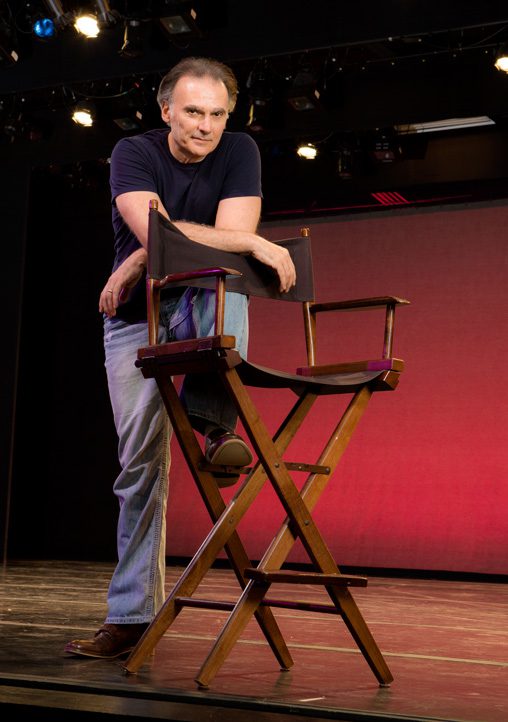
Born and raised in Naples, Italy, and watching ballet performances from backstage before he was 1 year old, it might seem unlikely that Marcello Angelini would end up in Tulsa, Oklahoma. He says he believes it was destiny.
“Twenty years ago, I was 33 and dancing with Cincinnati Ballet after three years with Les Grands Ballet Canadienes [in Montreal]. I had a strong tendinitis, and my doctor told me that this time, I had to stop for a couple of weeks,” Angelini says.
Frustrated and restless, Angelini called his manager and told him that one day, he would like to direct a company.
“He patiently explained that the fact that I wanted to direct a company didn’t necessarily translate into landing a job,” Angelini says. “But then he went on to tell me that Tulsa Ballet was looking for an artistic director. He urged me to apply for the position, explaining that with my limited command of the English language, and having no previous experience on the administrative side, it would take awhile and quite a few interviews to learn the process and maybe land a job.”
Angelini says he was stunned when he was later offered the job, which he says was a massive transition. He celebrates his 20th anniversary as artistic director of the Tulsa Ballet this year.
“I knew a thing or two about dance but nothing about all the moving pieces that make a company function, day in and day out. I had to learn a lot and very quickly,” Angelini says. “Of course, the learning never stops. You go from physical overload as a dancer to brain overload as a director.”

Angelini began his dancing career in Naples at the San Carlo Opera House school, then studied ballet in the former Soviet Union on a government scholarship. When he joined the Maggio Musicale Fiorentino in Florence 35 years ago, he met his wife, Daniela Buson. They danced together as soloists in Berlin and later as principals in companies all over the world: Scotland, England, Chile and all the major Italian companies.
Joining the Tulsa Ballet as artistic director threw Angelini into a completely different side of dance, but he says he saw the possibilities in his new city right away.
“Coming from the outside and having lived all over the world before arriving here, I could immediately see that this community had the potential to become something special. That presented an opportunity – that of being part of something bigger than all of us and the opportunity to be part of the growth and expansion of this region,” Angelini says.
Now, Angelini says, Tulsa is well-known for its ballet.
“Everybody knows the Tulsa Ballet. Today I can call any choreographer in the world and they know exactly who we are and what we do. Tulsa Ballet plays on the world stage,” Angelini says.
But that’s not to say that this transition happened right away. Angelini says when he began as artistic director, he inherited a good company with a very strong tradition. However, the company presented works that he called “introspective,” so he sought to expand the company’s repertoire to include the same works by choreographers that are presented in New York, Paris, London or Moscow. Because of Tulsa’s location nearly in the very center of a large country, this wasn’t always easy, but Angelini says he felt it important to bring all the top artists and best art works to Tulsa.
“That made us a player on the national and international scene, a role that we honored. Today, Tulsa Ballet not only presents the top works of the top dance makers in the world, but also creates new works and exports them all over the world,” Angelini says.[pullquote]I am one person, one member of a great team of visionary people who are not afraid to dream big and sweat hard to make the dream a reality.”[/pullquote]
To date, works created in Tulsa have been performed in South Korea, Germany, France, Turkey and more. Also, during the past 20 years, Tulsa Ballet has opened its own academy, the Tulsa Ballet Center for Dance Education. The academy boasts 380 students and continues to grow, Angelini says. The ballet has also built Studio K exclusively for the purpose of creating new works, expanded its dancers’ seasons to 40 weeks and taken the company on its first international tours.
“The only reason we were able to achieve these high goals is that all of us – board, staff and myself – were all on the same page, shared the same dreams, engineered ways to make them a reality, and achieved what we set out to accomplish,” Angelini says. “I am one person, one member of a great team of visionary people who are not afraid to dream big and sweat hard to make the dream a reality.”
 This strong relationship with the entire team of the Tulsa Ballet is one of several reasons he has stayed in Tulsa and greatly enjoyed his job, Angelini says, and he also loves the city and its people.
This strong relationship with the entire team of the Tulsa Ballet is one of several reasons he has stayed in Tulsa and greatly enjoyed his job, Angelini says, and he also loves the city and its people.
“It’s a friendly community of smart, simple people – smart, visionary and adventurous,” Angelini says.
At home, Angelini says dance cannot be separated from life. Angelini’s wife, Daniela, is Tulsa Ballet’s ballet mistress, continuing to teach and coach the dancers. After watching his father dance growing up, beginning to dance professionally at 17, and meeting his wife while dancing, Angelini says dance and life are one and the same. On a larger scale, Angelini says the arts are hugely important for everything.
“Culturally, the arts are the human race’s DNA. Through the arts you can discover who we were, who we are and where we are going as a people. And the arts are also important for business,” Angelini says. “It’s the landscaping of a community. Did you ever see a magnificent house with shabby or no landscaping? Do you know of a great city in the world where there are no thriving arts? They complete the wholeness of a community, push and expand the cultural boundaries of a city, and greatly enhance the quality of life of the region.”

























